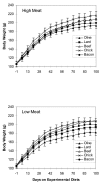Effect of meat (beef, chicken, and bacon) on rat colon carcinogenesis
- PMID: 10050267
- PMCID: PMC2527479
- DOI: 10.1080/01635589809514736
Effect of meat (beef, chicken, and bacon) on rat colon carcinogenesis
Abstract
High intake of red meat or processed meat is associated with increased risk of colon cancer. In contrast, consumption of white meat (chicken) is not associated with risk and might even reduce the occurrence of colorectal cancer. We speculated that a diet containing beef or bacon would increase and a diet containing chicken would decrease colon carcinogenesis in rats. One hundred female Fischer 344 rats were given a single injection of azoxymethane (20 mg/kg i.p.), then randomized to 10 different AIN-76-based diets. Five diets were adjusted to 14% fat and 23% protein and five other diets to 28% fat and 40% protein. Fat and protein were supplied by 1) lard and casein, 2) olive oil and casein, 3) beef, 4) chicken with skin, and 5) bacon. Meat diets contained 30% or 60% freeze-dried fried meat. The diets were given ad libitum for 100 days, then colon tumor promotion was assessed by the multiplicity of aberrant crypt foci [number of crypts per aberrant crypt focus (ACF)]. The ACF multiplicity was nearly the same in all groups, except bacon-fed rats, with no effect of fat and protein level or source (p = 0.7 between 8 groups by analysis of variance). In contrast, compared with lard- and casein-fed controls, the ACF multiplicity was reduced by 12% in rats fed a diet with 30% bacon and by 20% in rats fed a diet with 60% bacon (p < 0.001). The water intake was higher in bacon-fed rats than in controls (p < 0.0001). The concentrations of iron and bile acids in fecal water and total fatty acids in feces changed with diet, but there was no correlation between these concentrations and the ACF multiplicity. Thus the hypothesis that colonic iron, bile acids, or total fatty acids can promote colon tumors is not supported by this study. The results suggest that, in rats, beef does not promote the growth of ACF and chicken does not protect against colon carcinogenesis. A bacon-based diet appears to protect against carcinogenesis, perhaps because bacon contains 5% NaCl and increased the rats' water intake.
Figures

Similar articles
-
Meat and cancer: haemoglobin and haemin in a low-calcium diet promote colorectal carcinogenesis at the aberrant crypt stage in rats.Carcinogenesis. 2003 Oct;24(10):1683-90. doi: 10.1093/carcin/bgg130. Epub 2003 Aug 1. Carcinogenesis. 2003. PMID: 12896910 Free PMC article.
-
Endogenous N-nitroso compounds, and their precursors, present in bacon, do not initiate or promote aberrant crypt foci in the colon of rats.Nutr Cancer. 2000;38(1):74-80. doi: 10.1207/S15327914NC381_11. Nutr Cancer. 2000. PMID: 11341048 Free PMC article.
-
Beef meat and blood sausage promote the formation of azoxymethane-induced mucin-depleted foci and aberrant crypt foci in rat colons.J Nutr. 2004 Oct;134(10):2711-6. doi: 10.1093/jn/134.10.2711. J Nutr. 2004. PMID: 15465771
-
Modulation of experimental colon tumorigenesis by types and amounts of dietary fatty acids.Cancer Res. 2001 Mar 1;61(5):1927-33. Cancer Res. 2001. PMID: 11280748
-
Thomas G. Orr Memorial Lectureship. Colon cancer from etiology to prevention.Am J Surg. 1997 Dec;174(6):578-82. doi: 10.1016/s0002-9610(97)00207-9. Am J Surg. 1997. PMID: 9409576 Review.
Cited by
-
Meat and cancer: haemoglobin and haemin in a low-calcium diet promote colorectal carcinogenesis at the aberrant crypt stage in rats.Carcinogenesis. 2003 Oct;24(10):1683-90. doi: 10.1093/carcin/bgg130. Epub 2003 Aug 1. Carcinogenesis. 2003. PMID: 12896910 Free PMC article.
-
Processed meat and colorectal cancer: a review of epidemiologic and experimental evidence.Nutr Cancer. 2008;60(2):131-44. doi: 10.1080/01635580701684872. Nutr Cancer. 2008. PMID: 18444144 Free PMC article. Review.
-
Calcium carbonate suppresses haem toxicity markers without calcium phosphate side effects on colon carcinogenesis.Br J Nutr. 2011 Feb;105(3):384-92. doi: 10.1017/S0007114510003624. Epub 2010 Dec 7. Br J Nutr. 2011. PMID: 21134327 Free PMC article.
-
Endogenous N-nitroso compounds, and their precursors, present in bacon, do not initiate or promote aberrant crypt foci in the colon of rats.Nutr Cancer. 2000;38(1):74-80. doi: 10.1207/S15327914NC381_11. Nutr Cancer. 2000. PMID: 11341048 Free PMC article.
-
Meat processing and colon carcinogenesis: cooked, nitrite-treated, and oxidized high-heme cured meat promotes mucin-depleted foci in rats.Cancer Prev Res (Phila). 2010 Jul;3(7):852-64. doi: 10.1158/1940-6207.CAPR-09-0160. Epub 2010 Jun 8. Cancer Prev Res (Phila). 2010. PMID: 20530708 Free PMC article.
References
-
- Potter JD. Reconciling the epidemiology, physiology, and molecular biology of colon cancer. J Am Med Assoc. 1992;268:1573–1577. - PubMed
-
- Armstrong B, Doll R. Environmental factors and cancer incidence and mortality in different countries with special reference to dietary practices. Int J Cancer. 1975;15:617–631. - PubMed
-
- Parnaud G, Corpet DE. Colorectal cancer : controversial role of meat consumption. Bull Cancer. 1997;84:899–911. - PubMed
-
- Willett WC, Stampfer MJ, Colditz GA, Rosner BA, Speizer FE. Relation of meat, fat, and fiber intake to the risk of colon cancer in a prospective study among women. N Engl J Med. 1990;323:1664–1672. - PubMed
-
- Giovannucci E, Rimm EB, Stampfer MJ, Colditz GA, Ascherio A, et al. Intake of fat, meat, and fiber in relation to risk of colon cancer in men. Cancer Res. 1994;54:2390–2397. - PubMed
